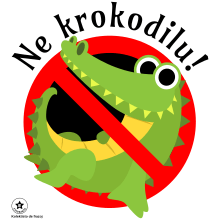krokodili
Esperanto
FWOTD – 10 September 2016

"Ne krokodilu" sign
Etymology
From krokodilo (“crocodile”). The origin of the expression is unclear. Several suggestions have been made:
- From the fact that crocodiles' extremely large mouths make an apt comparison for carelessly flapping one's jaws without consideration.[1][2][3]
- Ferrari, an Esperantist in Paris in the 1930s, would comment Kion volas tiuj krokodiloj? (What do those crocodiles want?) when noisy non-Esperantists entered the cafe where he was speaking Esperanto with friends.[4]
- Students of Andreo Cseh. When Cseh taught Esperanto, students were only allowed to speak their native language when they were holding a wooden crocodile he always brought with him.
The latter two may be allusions to the idiom rather than its source.
Pronunciation
- IPA(key): /krokoˈdili/
Verb
krokodili (present krokodilas, past krokodilis, future krokodilos, conditional krokodilus, volitive krokodilu)
- (slang) to speak among Esperantists in a language besides Esperanto, especially one's native language or a language not spoken by everyone present (literally, "to crocodile")
Conjugation
Conjugation of krokodili
| |||||||||||||||||||||||||||||||||||||||||||||||||||||||||||||||||||||||||||||||||||||
Antonyms
- malkrokodili (“to speak in Esperanto among non-Esperanto speakers”)
References
- Arika Okrent (2010: 113) In the Land of Invented Languages: A Celebration of Linguistic Creativity, Madness, and Genius
- Lindstedt, Jouko (2010) Esperanto as a Family Language
- Joseph F. Conroy (1999: 223 pp.) Esperanto-English/English-Esperanto Dictionary & Phrasebook
- Andreo Ĉerpiljodo (2006: 185) Lingvaj Babilaĵoj
Ido
This article is issued from
Wiktionary.
The text is licensed under Creative
Commons - Attribution - Sharealike.
Additional terms may apply for the media files.